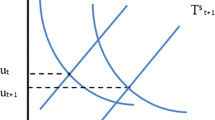Abstract
Above the solid base founded by Alfred Marshall, Robert Solow, Paul Romer, and other famous economists around the world, this article focuses on exploring new aspects of economic growth based on the Romer Economic Growth Model. By adding two new variables, the heterogeneity and the ability to absorb knowledge, into the model, which are two main conditions that allows the spillover effect of knowledge, this article realizes that such an effect is, in fact, a mutual communication between industries, in which they absorb knowledge from each other. In order to set up a new model based on the Romer Economic Growth Model, this article imports the two variables into the model, and finally achieve a new endogenous economic growth model. Theoretically, this will be a more inclusive economic growth model: Romer Economic Growth Model, Solow Growth Model, and AK Model are all special situations of this model. Mathematically, since this model emphasizes the impact of ability to absorb knowledge in the economic growth, comparing to previous economic growth models, this one will hold a stronger point in explaining endogenous economic growth.
Access this chapter
Tax calculation will be finalised at checkout
Purchases are for personal use only
Similar content being viewed by others
References
Arrow, K.J.: The economic implications of learning by doing. In: Readings in the Theory of Growth, pp. 131–149. Palgrave Macmillan, London (1971)
Kaldor, N.: A model of economic growth. Econ. J. 67(268), 591–624 (1957)
Solow, R.M.: A contribution to the theory of economic growth. Q. J. Econ. 70(1), 65–94 (1956)
Uzawa, H.: Optimum technical change in an aggregative model of economic growth. Int. Econ. Rev. 6(1), 18–31 (1965)
Romer, P.M.: Increasing returns and long-run growth. J. Polit. Econ. 94(5), 1002–1037 (1986)
Aghion, P., Howitt, P., Howitt, P.W., Brant-Collett, M., García-Peñalosa, C.: Endogenous Growth Theory. MIT Press, Cambridge (1998)
Barro, R.J.: Determinants of economic growth: a cross-country empirical study, No. w5698. National Bureau of Economic Research (1996)
Cass, D.: Optimum growth in an aggregative model of capital accumulation. Rev. Econ. Stud. 32(3), 233–240 (1965)
Hussein, K., Thirlwall, A.P.: The AK model of “new” growth theory is the Harrod-Domar growth equation: investment and growth revisited. J. Post Keynes. Econ. 22(3), 427–435 (2000)
Ng, Y.K.: The economic theory of clubs: Pareto optimality conditions. Economica 40(159), 291–298 (1973)
Author information
Authors and Affiliations
Editor information
Editors and Affiliations
Rights and permissions
Copyright information
© 2021 The Author(s), under exclusive license to Springer Nature Singapore Pte Ltd.
About this paper
Cite this paper
Zhu, Z. (2021). Ability to Absorb Knowledge and Endogenous Economic Growth: Expansion of Romer Economic Model. In: Yuan, C., Li, X., Kent, J. (eds) Proceedings of the 4th International Conference on Economic Management and Green Development. Applied Economics and Policy Studies. Springer, Singapore. https://doi.org/10.1007/978-981-16-5359-9_46
Download citation
DOI: https://doi.org/10.1007/978-981-16-5359-9_46
Published:
Publisher Name: Springer, Singapore
Print ISBN: 978-981-16-5358-2
Online ISBN: 978-981-16-5359-9
eBook Packages: Economics and FinanceEconomics and Finance (R0)



